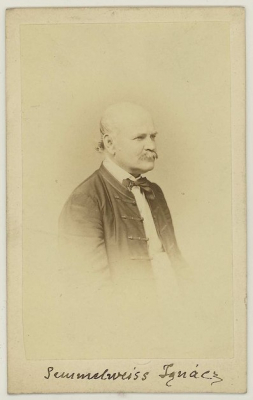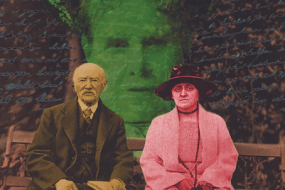Dr Semmelweis: A spectacular play on a medical scandal

Ignaz Semmelweis in 1860 - Wiki image
Semmelweis is a fast-moving and expressive production that tells the story of a maverick 19th century doctor, determined to save the lives of young women dying of childbed fever.
Hungarian physician Ignaz Semmelweis came up with the idea that people should wash their hands in an antiseptic solution before going into a ward. Although this practice was effective, his ideas were consistently dismissed by the medical establishment, much to his frustration and fury.
Not long after starting at Vienna General Hospital, then the biggest hospital in Europe, Semmelweis (played by Mark Rylance) attends a young pregnant woman who begs to be admitted to the midwives' rather than the doctors' ward - outside the hospital, it is common knowledge you were more likely to survive in the former. Despite Semmelweis' assurances about the care she will receive in the doctors' ward, she and her baby die there of childbed fever.
Her fears are borne out; hospital records show that women are far more likely to die in the ward run by doctors than that run by midwives, and the deaths appear to be accepted as routine.
To find out more, Semmelweis approaches head midwife Anna Müller (a terrific performance by Pauline McLynn), at one point taking her to the ballet - with uproarious results. She is well aware of what is happening yet only Semmelweis, not the senior doctors, recognises her knowledge and experience.
He finds that the only difference in circumstances between the women who live and those who die is that the latter are more likely to be attended to by doctors (you don't realise at at the time but you get a short lesson in how to run a scientific experiment). Why could this be?
A fellow doctor develops an infection very like childbed fever after being injured with a scalpel during an autopsy - and Semmelweis makes the connection. Doctors went straight to their patients on the ward after attending autopsies, often of women who had died of the infection.
Chlorine solution is used to remove the smell after autopsies, so Semmelweis makes anyone entering the obstetric ward wash their hands in this antiseptic.
His theory proves extremely controversial - how could doctors' routine practice be killing so many women and babies? - and is vehemently rejected by senior medics, including his superior, Professor Johann Klein (Alan Williams).
It was not known then that microorganisms could cause disease, so Semmelweis struggles to explain the theory of how infection spreads. In the meantime, Professor Klein is adamant that a new window in the doctors' ward will reduce deaths.
Semmelweis is single-minded and outspoken to the point of aggression. He clashes with his superiors - making accusations of murder - and causes offence when he insists a visiting baroness washes her hands before going into the ward.
Rylance is tremendous as he faces up to the medical establishment and the doctors' entrenched beliefs. His frustration and fury build up, and he eventually breaks down under their unbending refusal to even consider his findings. He becomes impatient and angry with everyone, including his friends and wife Maria (Amanda Wilkin).
The production is a spectacle. Across the stage, the all-female Salomé string quartet plays and dancers whirl, expressing a huge range of emotions, a representation of the mothers who died, reminding us that the deaths are not just numbers.
Semmelweis died aged 47 of infection - probably the result of injuries inflicted by staff - while detained in a psychiatric hospital. Semmelweis' antisepsis theory was not accepted for decades.
Although it tells a grim cautionary tale, it never fails to hold the attention - there's a lot going on on stage at times - and may well give Ignaz Semmelweis the profile he deserves.
• Dr Semmelweis, by Stephen Brown with Mark Rylance, directed by Tom Morris, is at the Harold Pinter Theatre until 7 October. Tickets from £15. Link: https://drsemmelweistheplay.com/


















